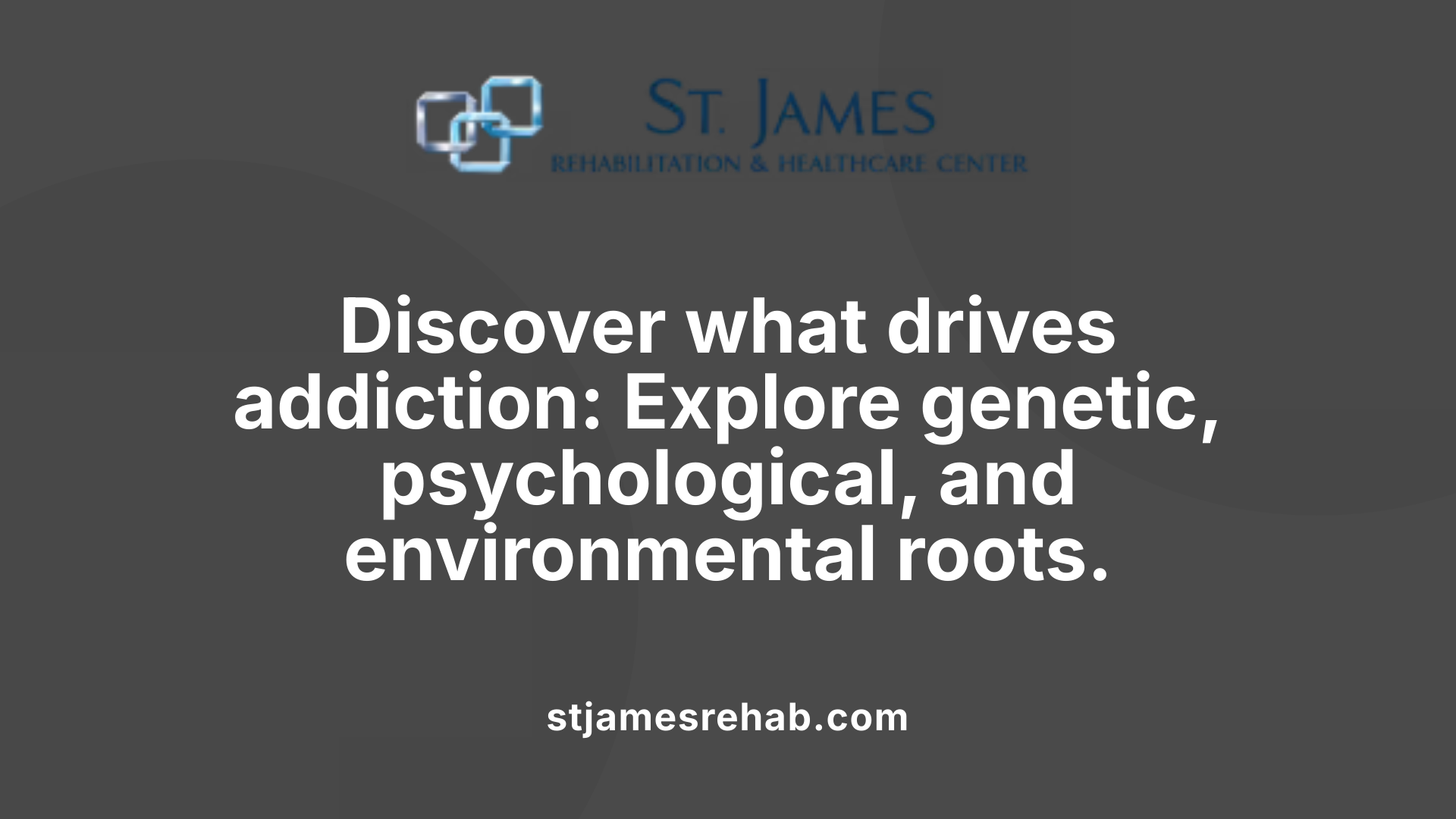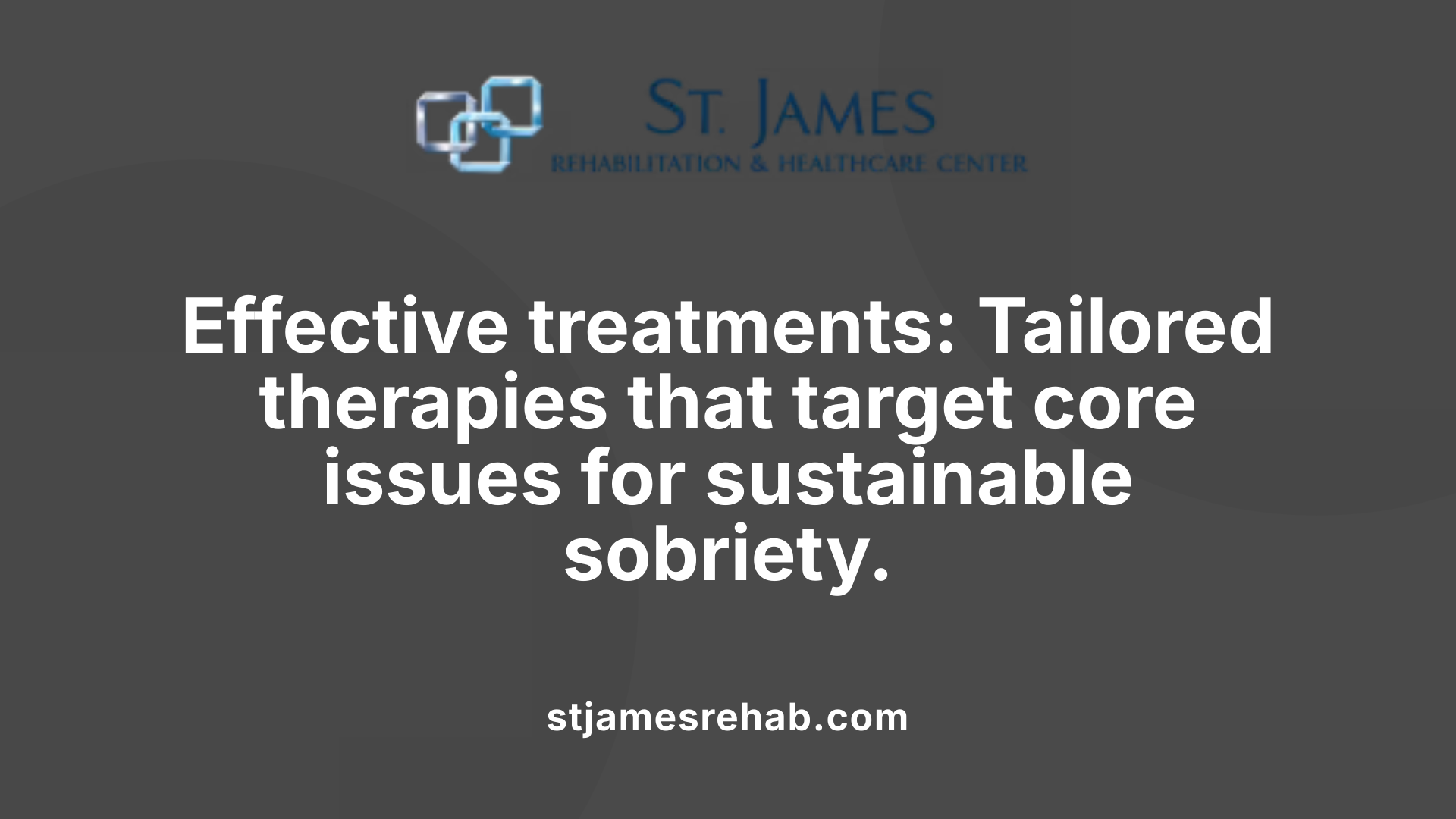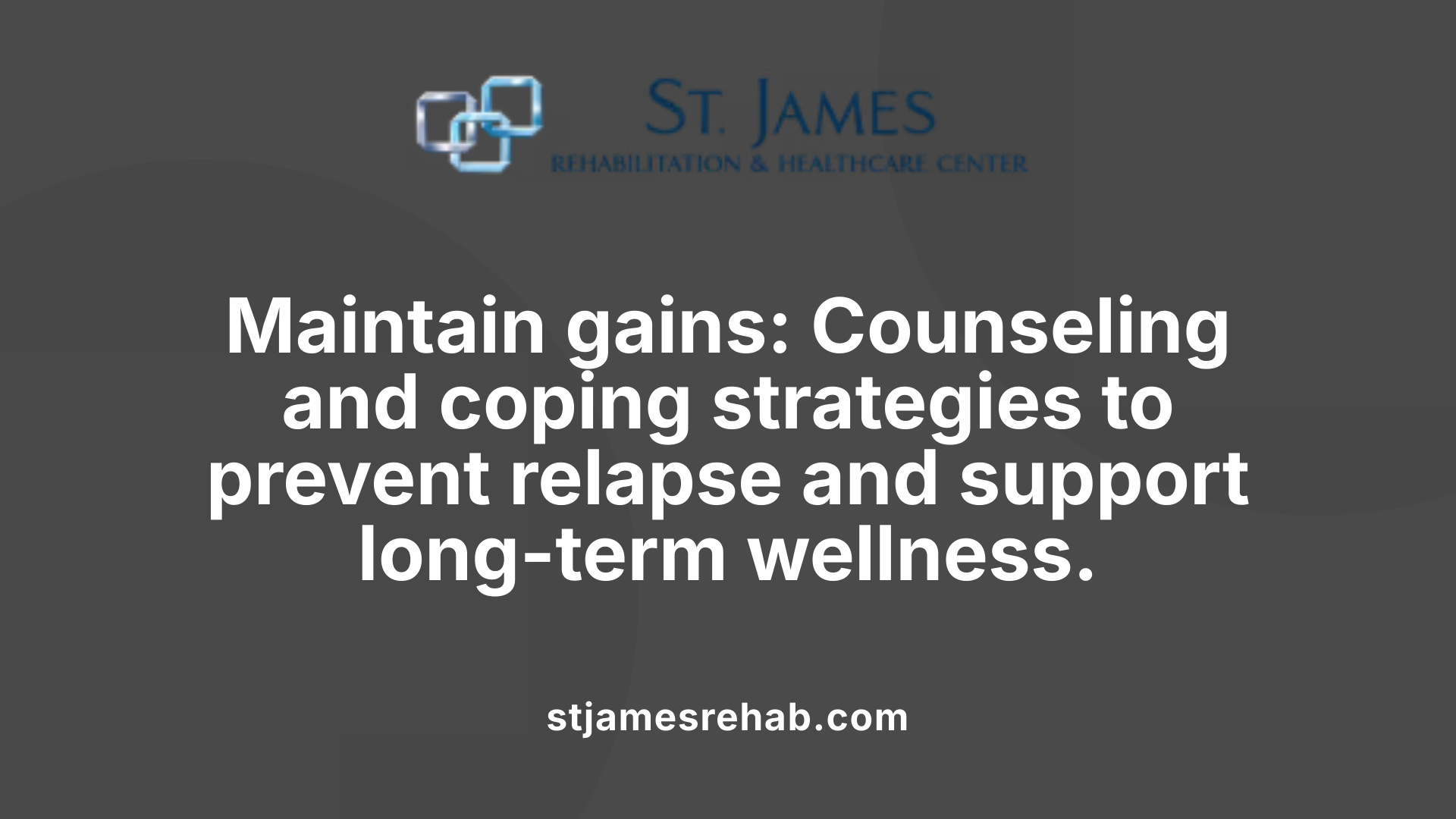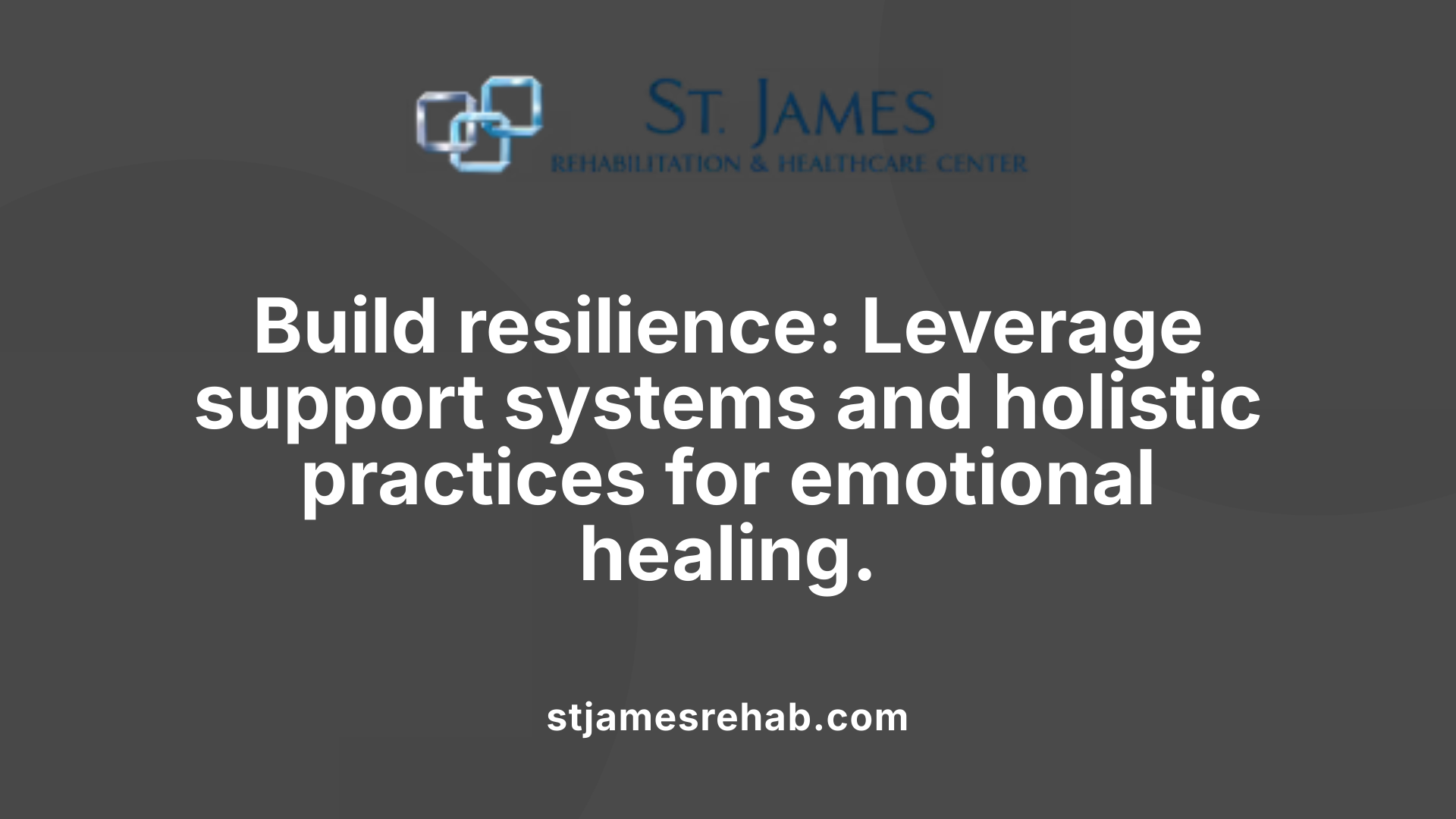How to Address the Root Causes of Addiction Through Therapy
Uncovering Deep-Rooted Causes to Foster Lasting Recovery

The Essential Role of Therapy in Understanding Addiction
Addiction is a complex and chronic disorder often misunderstood as a lack of willpower. Central to effective treatment is understanding and addressing its root causes—trauma, mental health, genetics, and environment. Therapy acts as a pivotal tool in uncovering these underlying issues, leading to meaningful and sustained recovery. This article explores how therapeutic approaches diagnose and treat these foundational factors, emphasizing their importance for long-term success in overcoming addiction.
Identifying the Underlying Causes of Addiction

How can the root causes of addiction be identified?
The root causes of addiction are complex and involve a mix of genetic, psychological, and environmental influences. A thorough understanding begins with a comprehensive assessment conducted by healthcare professionals.
One of the first steps involves examining genetic factors. About half of the risk for addiction can be inherited from family history, which predisposes individuals to substance dependence. If there is a known history of addiction in the family, it can increase vulnerability.
Psychological influences play a significant role. Childhood trauma, such as physical, emotional, or sexual abuse, neglect, or witnessing domestic violence, often impacts emotional regulation and coping skills. Additionally, mental health conditions like anxiety, depression, or post-traumatic stress disorder (PTSD) may lead individuals to self-medicate, escalating the risk of addiction.
Environmental impacts, including stress levels, community safety, and social support networks, also affect addiction vulnerability. Chronic stress from personal relationships, work environments, or neighborhood safety can trigger substance use as a coping mechanism.
Identifying these root causes involves detailed clinical evaluations, which may include interviews, psychological assessments, and reviewing biological and social histories. This comprehensive approach allows clinicians to understand each individual’s unique circumstances and develop tailored treatment plans.
In sum, recognizing the underlying factors that contribute to addiction not only facilitates targeted intervention but also enhances the potential for lasting recovery. A detailed assessment remains essential for uncovering these complex influences.
For further insights, performing a comprehensive assessment of addiction root causes involves a multidisciplinary approach that considers biological, psychological, and social dimensions, offering a clearer pathway toward effective treatment strategies.
Understanding the Science Behind Addiction and Its Roots
Why is understanding the underlying factors important in addiction recovery?
Knowing what causes addiction helps tailor effective treatments. Addiction isn’t just about losing control; it involves deep changes in brain chemistry and emotional health. When treatment addresses these core issues, it can lead to more sustainable recovery.
Addiction often stems from psychological pain, trauma, or genetic predispositions. By understanding these roots, healthcare providers can develop personalized plans that target the specific needs of each individual. This might include therapy for trauma, medication for mental health conditions, or support to improve self-efficacy.
Addressing the underlying factors also reduces stigma. When people see addiction as a health condition rooted in brain and emotional factors, they are more likely to seek help. It encourages a compassionate approach, emphasizing healing rather than judgment.
Furthermore, exploring these causes strengthens motivation and resilience. Support systems, environmental changes, and emotional healing work together when the root issues are recognized. This comprehensive understanding promotes long-term sobriety by resolving the emotional wounds and dysfunctional beliefs that fuel addictive behaviors.
In sum, understanding the deeper causes of addiction guides holistic treatment, fostering not just abstinence but overall well-being. It helps individuals rebuild their lives from the inside out, tackling the disease at its core.
Therapeutic Approaches to Address Underlying Causes

What therapeutic approaches are most effective for addressing addiction?
Effective treatment for addiction usually involves a mix of proven, evidence-based therapies tailored specifically to each individual's circumstances. One of the most widely used therapies is Cognitive-Behavioral Therapy (CBT). This approach helps individuals recognize and alter negative thought patterns, learn healthier coping skills, and develop resilience against relapse.
In addition to CBT, therapies such as Dialectical Behavior Therapy (DBT) focus on emotional regulation and interpersonal effectiveness, which are crucial in managing intense feelings that may trigger substance use. Motivational Interviewing (MI) plays a vital role in enhancing a person's motivation to change, especially when they feel ambivalent about recovery.
Psychodynamic therapy seeks to uncover and address unconscious emotional conflicts rooted in past experiences, often related to trauma or unresolved issues. Family therapy and group therapy serve as powerful support tools, fostering communication, understanding, and accountability within interpersonal relationships.
Many treatment plans also incorporate experiential therapies like art, music, or equine-assisted therapy, which facilitate emotional expression and healing. When appropriate, medications may be integrated to help manage withdrawal symptoms and cravings, especially in cases involving opioids, nicotine, or alcohol.
Participation in support groups such as Alcoholics Anonymous (AA) or Narcotics Anonymous (NA) complements clinical treatment, providing ongoing peer support. Healthcare providers and treatment facilities equipped with multidisciplinary teams ensure comprehensive care, addressing the biological, psychological, and social aspects of addiction.
Findings from recent research emphasize that combining these approaches and individualizing treatment strategies greatly improves recovery outcomes. Addressing underlying causes such as trauma, mental health disorders, and environmental influences is fundamental for long-term sobriety.
For further understanding of this subject, consulting sources on evidence-based addiction therapy methods can provide valuable insights.
Uncovering and Treating Unresolved Trauma and Co-Occurring Disorders

How does therapy help in uncovering and treating underlying causes of addiction?
Therapy is instrumental in revealing and addressing the root issues behind addiction. Many individuals use substances to cope with unresolved trauma and co-occurring mental health disorders like depression, anxiety, or PTSD. Evidence-based therapies such as cognitive-behavioral therapy (CBT) and dialectical behavior therapy (DBT) help identify negative thought patterns, emotional triggers, and unresolved traumatic memories.
Trauma-informed therapy approaches are designed to create a safe space where individuals can explore painful experiences without feeling overwhelmed. These therapies help process trauma, reduce emotional distress, and develop healthier coping strategies.
Family and group therapy sessions foster social support, improve communication, and address relational conflicts that might contribute to continued substance use. Holistic therapies like mindfulness, art therapy, and eye movement desensitization and reprocessing (EMDR) support emotional regulation and trauma recovery.
The ultimate goal of therapy is to uncover and heal deep-seated issues, helping individuals understand the emotional and psychological factors fueling their addiction. This comprehensive approach encourages lasting recovery by tackling the core problems, not just the symptoms.
The Importance of Therapy in Long-Term Recovery and Relapse Prevention

Why is understanding the underlying factors important in addiction recovery?
Gaining insight into the root causes of addiction is a cornerstone of effective long-term recovery. When individuals understand what triggers their addictive behaviors—whether it is unresolved trauma, mental health issues like anxiety or depression, or environmental stressors—they can work with therapists to develop targeted strategies.
Therapy helps uncover these underlying issues, allowing for a personalized treatment plan. This approach addresses emotional pain, maladaptive coping mechanisms, and dysfunctional beliefs that fuel addiction. Recognizing factors such as childhood trauma, mental health diagnoses, or genetic predispositions fosters resilience and enhances motivation to stay sober.
Moreover, understanding these roots reduces stigma and shame, empowering individuals to seek help and support. It also enables them to manage high-risk situations, avoid triggers, and respond effectively if cravings occur. Addressing core issues through therapy leads to a deeper healing process, beyond just stopping substance use, supporting sustained sobriety and overall well-being.
Developing healthy coping strategies
Therapists guide individuals in building positive ways to manage stress, emotional pain, and everyday challenges. Techniques like mindfulness, relaxation exercises, and emotional regulation skills help replace unhealthy habits.
Identifying triggers and high-risk situations
Therapy aids in pinpointing specific situations, people, or feelings that increase vulnerability to relapse. Recognizing these allows individuals to prepare strategies, such as avoiding certain environments or developing alternative responses.
The role of support systems and ongoing therapy
A strong support network—including family, friends, support groups, and ongoing counseling—plays a crucial role. Continued therapy offers a safe space to explore setbacks, reinforce coping skills, and stay motivated.
Regular check-ins with mental health professionals help adapt treatment as needs evolve, ensuring long-term success. Integrating therapy with community support creates a comprehensive approach, equipping individuals with the tools to maintain their sobriety and navigate life's challenges.
Addressing the root causes of addiction not only helps prevent relapse but also fosters personal growth and emotional health, laying a strong foundation for a fulfilling, addiction-free life.
The Role of Support Networks and Holistic Approaches

How can therapy foster emotional healing and resilience?
Therapy creates a safe space for individuals to explore their feelings, understand their experiences, and develop healthy ways to cope with challenges. By addressing emotional wounds and underlying issues, therapy strengthens resilience, making it easier to handle stress and setbacks.
Self-awareness practices like mindfulness and journaling are often incorporated into therapy. Mindfulness enhances present-moment awareness, helping individuals recognize triggers without judgment. Journaling fosters reflection, helping people identify patterns in their thoughts, emotions, and behaviors.
Relationship mapping and other introspective exercises enable clients to understand their support systems and improve communication skills. These activities build emotional strength and foster a sense of self-understanding.
Support networks—such as family, friends, peer groups, and community resources—are vital for sustained recovery. They offer ongoing encouragement, accountability, and a sense of belonging.
Complementary therapies like art, music, and meditation further support emotional healing. Art and music therapy allow expression beyond words, helping process trauma and reduce anxiety. Meditation and relaxation techniques lower stress levels, promote emotional regulation, and enhance overall well-being.
By integrating these approaches, therapy not only addresses the root causes of addiction but also promotes resilience and self-empowerment. This comprehensive support system helps individuals recover from past wounds, develop inner strength, and face future challenges with confidence, ultimately reducing the risk of relapse and fostering long-term recovery.
Moving Forward with a Deeper Understanding
Addressing the root causes of addiction through therapy is vital for achieving long-lasting recovery. By comprehensively evaluating genetic, psychological, and environmental influences, therapists can develop personalized treatment plans that target the core issues driving substance use. Approaches like CBT, trauma therapy, family counseling, and holistic practices contribute to emotional healing, improved coping skills, and resilience. Recognizing and treating underlying mental health conditions and trauma not only alleviates symptoms but also transforms the individual's relationship with themselves and their environment. Ultimately, this deep understanding fosters sustainable recovery, reduces relapse risk, and supports individuals in building fulfilling, drug-free lives. Therapy remains an essential pillar in the journey toward health and wellness, empowering individuals to reclaim control and find lasting peace.
References
- National Helpline for Mental Health, Drug, Alcohol Issues - SAMHSA
- Treatment and Recovery | National Institute on Drug Abuse (NIDA)
- What Is the Root Cause of Addiction? - Chapters Recovery Center
- Addiction: What It Is, Causes, Symptoms, Types & Treatment
- How can therapy help me understand the root causes of my addiction?
- Understanding Drug Use and Addiction DrugFacts
- The Emotional Component of Addiction's Root Causes - Harris House
- 5 Benefits of Talk Therapy for Addiction - The Canyon at Santa Monica
- The Surprising Underlying Causes of Addiction
- Why Identifying the Root Cause of Addiction Is Important






